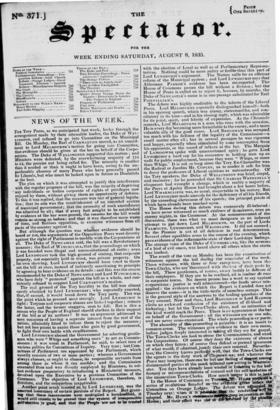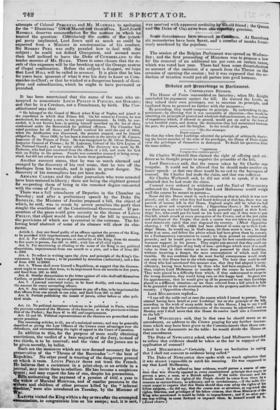NEWS OF THE WEEK.
THE Tory Peers, as we anticipated last week, broke through the arrangement made by their ostensible leader, the Duke of WELLINGTON, and refused to go into Committee on the Municipal Bill. On Monday, the Earl of CARNARVON moved, as an amendment to Lord MELBOURNE'S motion for going into Committee, that evidence should be given at the bar on behalf of the Corporations. The Duke of WELLINGTON supported this motion ; and Ministers were defeated, by the overwhelming majority of 124 to 54, the proxies not being called for. The minority is smaller than it needed or than it ought to have been, owing to the unpardonable absence of many Peers who have generally passed for Liberals, but who must be looked upon in future as Doubtfuls at the best.
The plea on which it was attempted to justify this interference with the regular progress of the bill, was the iniquity of depriving
• any individuals or bodies corporate of rights or privileges now enjoyed by them, without giving them an opportunity of defence. To this it was replied, that the measure was one of general legislation; that its aim was the establishment of an amended system of municipal government; that the necessity of such amendment was admitted by all ; that if every fact sought to be established by evidence at the bar were proved, the reasons for the bill would remain as strong as before; and that it was therefore mere waste of time, and factious opposition, to examine witnesses from all parts of the country against it.
But although the question was whether evidence should be heard or not, the arguments of the Opposition Peers went directly against the right of Parliament to meddle with the Corporations at all. The Duke of NEWCASTLE said, the bill was a Revolutionary measure; the Earl of WINCH' I.SE A, that the proceedings on which it was founded were illegal and unconstitutional ab ; even Lord LYNDHURST took the high ground of stating, that corporate property, not especially held in trust, was private property. On „ his own showing. Lord LYNDHURST should have voted to throw out the bill at once, instead of indirectly sanctioning its principle by agreeing to hear evidence on its details : and this was the course recommended by the Duke of NEWCASTLE and Lord WI NC HI LSE A, who have duly "protested" against the bill as a whole, and consistently refused to support Lord C AR N ARVON'S motion.
The real ground of the Tory hostility to the bill was almost openly admitted • by Lord LYNDHURST; who repeatedly asserted, that,rif carried, it would break down the Tory party. This was the point which he pressed most strongly. Lord LYNDH URST is right : Toryism and corporate abuses are linked together ; remove the latter, and the former staggers, soon to fall. But is this a reason why the People of England should slacken in their Support of the bill or of its authors? It was an argument addressed to men conscious of having a separate interest from the rest of the nation, admirably fitted to induce them to reject the measure; but not less potent to excite those who gain by good government, to fight their own battle with steadfastness.
' Lord Lveratuasx abused the Government for selecting gentlemen who were" Whigs and something more" to act as Commissioners: it was usual in Parliament, he said, to select men of various politics for Committees of Inquiry. Very true; butCommittees of Parliament are appointed by the Parliament, which usually consists of two or more parties; whereas a Government always chooses, or ought to choose, its responsible servants from among those in whom it can confide; and the Commission emanated from and was directly employed by Ministers, to collect evidence preparatory to introducing a Ministerial measure, devolved upon the Executive by a previous Committee of the Commons. The objection of Lord LYNDHURST, therefore, is frivolous, and the comparison inapplicable.
Another point much insisted on by Lord IN NORCRST, was the asserted inaccuracy of certain portions of the Report. But granting that these inaccuracies were inultiplied a hundredfold, it would still remain to be proved that the system of irresponsible self-election is good, arid that the People are not to be trusted
753 with the election of Local as well as of Parliamentary Representatives. Nothing could be more paltry or feeble than this part of Lord LYNDHURST'S argument. The Nation calls for an efficient reform of the Municipal system ; and Lord LYNDHURST says that Alderman PARKER'S evidence has been misreported. The House of Commons passes the bill without a division ; but the' House of Peers is called on to reject it, because, by mistake, the Duke of NEWCASTLE'S name is in one passage substituted for Earl FITZWILLIAM'S.
The debate was highly creditable to the talents of the Liberal Peers. Lord MELBOURNE especially distinguished himself—both
in his opening speech, which was massy, statesmanlike, and conciliatory in its tone—and in his closing reply, which was admirable for its point, spirit, and felicity of expression. As the Chronicle remarks, Lord MELBOURNE is a man who rises with the occasion. He is every day becoming more formidable to the enemy, and a more valuable ally of the good cause. Lord BROUGHAM was occupied too much with his defence of the legality of the Commission—a small matter after all ; but in several passages he was vigorous and happy, especially when stimulated by some interruption front his opponents, or the crowd of talkers at the bar. The Marquis' of LANSDOWNE spoke with unaccustomed spirit : lie gave Lord LYNDHURST a hard rap for his assurance in holding men up as unfit for public employment, because they were " Whigs, or more than Whigs." It is not so long since the Tory Ex-Chancellor was. the Radical or Jacobin Mr. COPI:EY, as to render it safe for him to decry the professors of Liberal opinions as untrustworthy. Of the Tory speakers, the Duke of WELLINGTON was brief, stupid, and insincere ; for he pretended that Sir CHARLES WETHERELL'S eloquence had wrought a change, which in reality a majority of the Peers at Apsley House had brought about a few hours before. Lord WHARNCLIFFE was, as usual, respectable in his oratory. But Lord LYNIMSURST made amends for the deficiency of all his friends, by the exceeding cleverness of his speech; the principal points of which have already been touched upon. The House during this debate was excessively ill-behaved: we have never witnessed so much violence of demeanour, even on stormy nights, in the Commons.' At the commencement of the discussion, there was what we must designate as an indecent attempt to put down Lord MELBOURNE, on the part of Lords FALMOUTH, LYNDHURST, and WESTMEATH. It did not succeed ; for the Premier is not at all deficient in cool determination. Several other squabbles arose in the course of the evening, which
gave evidence of the inflammable state of their Lordships' feelings. The strange voice of the Duke of CU MBERL AND, like the screams of a bird of evil omen, was heard above all others when the storm was loudest.
The result of the vote on Monday has been the examination of witnesses against the bill during ther remainder of the week. Those witnesses, with three or four excep;ions, have been the Town-Clerks, who are 'threatened with the loss of their posts by , the bill. These gentlemen, of course, swore lustily in defence of their employers. If they are to be credited, all is couleur de rose in corporate towns. No decent person has a word to say against corporations : justice is well administered—the funds never-misapplied : the evidence on which the Report is founded does not deserve the name—it is the tittle-tattle of nameless scamps. This is the general style of the answers to the leading questions of the Tory counsel. Now and then, Lord BROUGHAM or Lord R.sreeoa elicits an awkward confession of the existence of ill-blood and bickering; but let the Town-Clerks alone, and no intimation of the kind would reach the Peers. There is no appearance at the bar on behalf of the Government : all the witnesses are on one side, and are never cross-examined. The whole proceeding is ex parte, The absurdity of this proceeding is palpable: it is an insult to common sense. The witnesses give evidence in their own cause, before judges deeply interested in taking all they say for gospel. The Town-Clerks are feed to abuse the Commissioners, and extol the Corporations. Of course they deny the existence of' abuses on which they fatten; of course they defend or preteni ignorance of what would, if admitted, justify their own removal. Nevertheless,' the Country knows perfeedff well, that the Town-Clerks are the agents in the dirty work of Chrporatims; and whatever the Peers may imagine, there can be but one feeliug of disgust among disinterested parties at the mock tribunal now sitting in Westminster. Ten days have already been wasted in listening to the buffoonery or misrepresentations of counsel and the selfriaudation of the immaculate Town-Clerks. How much lugger is this to blast-., In the House of Commons, on Tuestiner. Hums preicoeltr*If series of resolutions founded on the e given before *kir_ Committee on Orange Ledges. The debate was adjourned adopted. Mr. Humx's Nhoresee, -e resolottoniwiff
Tdesday next; when it is' th 4eep itnpression on ,
"55 A ,52 760 761 761 753 754 754 754 755
Heave; and their effect was not' aT Nets'ined by the phial* attempts of Colonel PRIMEVAL and Mr. MAXWELL to apologize for the " Illustrious " G?Ifit1Mastererid themselves. Lord Joni, RUSSELL deserves commeridation 'tor the meaner in which he treated the question. CdeSidering the station of the princespal party implicated, Lord JOHN said as much as could be expected from a Minister in condemnation of his conduct. Sir ROBERT PEEL was sadly puzzled how to deal with the subject : he could not defend Orangeism, and seemed more than half inclined to leave the _Duke of CUMBERLAND to the tender mercies of Mr. HUME. There is some chance that the remit of this exposure will be the breaking up of the Orange system of illegal combination. Before the subject is dropped, we hope that Lord HILL will be called to account. It is plain that he has for years been ignorant of what it was his duty to know as Commander-in-Chief; or that he winked at a dangerous breach of discipline and subordination, which he ought to have prevented or punished.



























